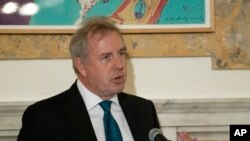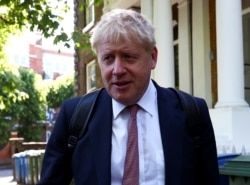Updated: July 10, 2019, 3:17 p.m.
VOA's Ken Bredemeier contributed to this report.
WASHINGTON — It is one of the low points in a U.S.- British relationship that has undergone numerous stresses since Redcoats torched the White House and the U.S. Capitol building in 1814.
Britain's ambassador to the United States, Kim Darroch, announced on Wednesday he is resigning, terming it impossible for him to remain in Washington as envoy following the leak of diplomatic cables in which he assailed President Donald Trump as "inept" and his administration as "uniquely dysfunctional."
After learning of Darroch's assessment, Trump responded on Twitter by calling Darroch "a very stupid guy" and a "pompous fool." The U.S. president also declared he would "no longer deal" with the British ambassador.
In his resignation statement, the outgoing British envoy said although his posting runs until the end of this year, "I believe in the current circumstances the responsible course is to allow the appointment of a new ambassador."
Following Trump's attacks and lukewarm, at best, support from Britain's presumptive next prime minister, Boris Johnson, Darroch's departure seemed inevitable.
"I think he did the honorable thing. He fell on his sword," said Cameron Hume, who served as U.S. ambassador to Algeria, South Africa and Indonesia.
"He became an issue. And when you become an issue, I think the honorable thing is to remove yourself and let somebody else take over," Hume told VOA.
Darroch has been Britain's top diplomat in Washington since 2016, pre-dating Trump's presidency.
In one of the cables published in Britain's Daily Mail newspaper, the 65-year-old Darroch said, "We don't really believe this administration is going to become substantially more normal; less dysfunctional; less unpredictable; less faction driven; less diplomatically clumsy and inept."
The leaked cables were intended for the eyes of senior British ministers and civil servants, but officials believe the leaker will be found among British politicians or officials, not a foreign government.
Trump used his attacks on Darroch to also renew his claim that he told British Prime Minister Theresa May how to carry out Brexit, Britain's planned but so far unsuccessful exit from the European Union, but that May "went her own foolish way [and] was unable to get it done. A disaster!"
That broadside against Britain and its leader, long a staunch U.S. ally, drew a sharp rebuke Tuesday from British Foreign Secretary Jeremy Hunt, who said Trump's comments were "disrespectful and wrong."
Hunt is opposing Johnson in the Conservative Party leadership race. And Hunt said that if he were to become prime minister when May leaves office at the end of the month, he wanted to retain Darroch as ambassador to Washington.
Johnson, the front-runner, stopped short of backing the ambassador during Tuesday's party leadership debate.
Even with a change of ambassadors and new prime minister soon in London, it is unclear how quickly the trans-Atlantic relationship can be fully repaired, which Brookings Institution Senior Fellow Thomas Wright sees as at its lowest point in a very long time.
Even if Johnson, who Trump likes, becomes prime minister, the power of the former foreign minister's personality "will not be enough to improve the relationship," said Wright, who is director of the Center on the United States and Europe at Brookings. "He will have to completely overhaul Theresa May's approach. He has to stopping giving Trump what he wants without condition. He must be transactional."
Ambassador Hume, however, sees less of a disruption to the critical relationship which last ruptured with the War of 1812.
"I don't think it affects the bilateral relationship too much," he said, predicting the next prime minister will start with a clean slate, select "one of their very good diplomats" as the next ambassador, and "I assume be touted as a great success."


